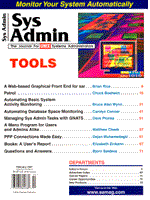
Editor's Forum
System administration tools, this month's theme, are essential to getting our jobs done. Whether the tool is a small piece of homegrown software to monitor a specific condition on a system or an elaborate commercial product for the management of a large heterogeneous network, the tool is a replication of one or more capabilities of a live system administrator. Assembling and coordinating the operation of a set of these microclones enables us to work more effectively and gives us the time to handle situations that require our personal attention. Our theme articles this month discuss a variety of tools for the system administrator's pouch, from keeping track of SA tasks with GNU's Gnats to monitoring various aspects of system activity. On a broader scale, system administration tools often provide us with the means to integrate different systems into a productive conglomerate. These tools also reflect core philosophies within UNIX. When properly designed, SA tools are small bits of software that do a single task well and can be combined with other tools to handle more expansive jobs. Most often, we write tools in shell or other small languages common in the UNIX environment, thus making the tool inherently platform independent. The shell provides a common API that works across virtually all UNIX systems - from early Xenix systems running on an Intel 8086-based system to present-day Digital UNIX machines running on 64-bit Alpha chips. We can migrate the tool to various systems on the network and can easily accommodate variations in different UNIX implementations. That is, after all, what UNIX is all about. Although the focus of this issue is on doing UNIX-based tasks more easily, we should also be thinking about how to use similar tools for MS-Windows and Windows NT tasks. Based on the discussions at the Microsoft Developer's Conference held in Long Beach, California in November of last year, we should be anticipating yet another round of massive software upgrades on the PC clients in our systems. In that meeting, Microsoft confirmed that they plan to release another series of radical changes in their desktop operating system. Within the next two to three years, expect a merger of Windows NT and Windows 9x into a new OS with a browser interface. If Microsoft follows their usual trend in operating system design, the merged system will likely have new APIs that are incompatible with both NT and 9x, meaning that we will also need to upgrade many of the third-party applications that run on our desktop systems. Has anyone else noticed something wrong with a paradigm in which a $90 OS upgrade forces application upgrades that can amount to thousands of dollars? I, for example, still run Windows 3.1 on my DOS box at home just for that reason. New versions of the other applications resident on that machine will total in excess of $2,000 - an amount that I am loathe to spend until absolutely necessary. Of course, if I were a more conventional user, I might only need the new versions of Microsoft Word, Microsoft Excel, Microsoft PowerPoint, and Microsoft whatever. Oh. I get the picture now. I wonder when my boss will.
Sincerely yours, |